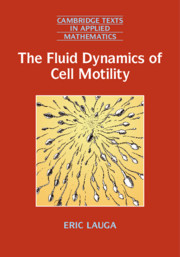Book contents
- Frontmatter
- Dedication
- Contents
- Preface
- Part One Fundamentals
- Part Two Cellular Locomotion
- 5 Flagella and the Physics of Viscous Propulsion
- 6 Hydrodynamics of Slender Filaments
- 7 Waving of Eukaryotic Flagella
- 8 Rotation of Bacterial Flagellar Filaments
- 9 Flows and Stresses Induced by Cells
- Part Three INTERACTIONS
- References
- Index
6 - Hydrodynamics of Slender Filaments
from Part Two - Cellular Locomotion
Published online by Cambridge University Press: 09 September 2020
- Frontmatter
- Dedication
- Contents
- Preface
- Part One Fundamentals
- Part Two Cellular Locomotion
- 5 Flagella and the Physics of Viscous Propulsion
- 6 Hydrodynamics of Slender Filaments
- 7 Waving of Eukaryotic Flagella
- 8 Rotation of Bacterial Flagellar Filaments
- 9 Flows and Stresses Induced by Cells
- Part Three INTERACTIONS
- References
- Index
Summary
The viscous drag acting on a moving filament is the key to predicting correctly the direction of flagellar propulsive forces. In this sixth chapter we provide the mathematical basis for this result by evaluating asymptotically the hydrodynamic forces experienced by slender filaments. After revisiting the classical solution for Stokes flow due to the translation of a rigid sphere, we capture the flow along weakly bent, slender filaments using a centreline distribution of two hydrodynamic singularities. We show that in the slender limit the flow near any cross section of the filament is dominated by a local anisotropic force density, which arises from hydrodynamic singularities in the vicinity of the cross section, whose magnitudes depend logarithmically on the aspect ratio of the filament (resistive-force theory). The introduction of additional singularities far from the local cross section of the filament allows us to derive an improved nonlocal integral relationship relating the velocity of the filament to the distribution of hydrodynamic forces (slender-body theory). We close by comparing theoretical predictions with experiments on rotating helices.
Keywords
- Type
- Chapter
- Information
- The Fluid Dynamics of Cell Motility , pp. 77 - 96Publisher: Cambridge University PressPrint publication year: 2020

